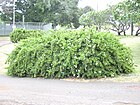Note: This is a project under development. The articles on this wiki are just being initiated and broadly incomplete. You can Help creating new pages.
Difference between revisions of "Jasminum multiflorum"
| Line 11: | Line 11: | ||
==Common names== | ==Common names== | ||
| − | {{Common names|sa=|en=|gu=|hi=|kn=|ks=|ml=|mr=|pa=|ta=|te=}} | + | {{Common names|sa=Attahasaka|en=Downy jasmine, Indian jasmine|gu=mogro|hi=Balini|kn=Dodda kaadu mallige|ks=|ml=Kundam|mr=Kunda|pa=|ta=Kasturi-mallikai|te=Kundamu}} |
==Properties== | ==Properties== | ||
| Line 72: | Line 72: | ||
==External Links== | ==External Links== | ||
| − | * [ ] | + | * [https://www.flowersofindia.net/catalog/slides/Kund.html Jasminum multiflorum on flowersofindia.net] |
| − | * [ ] | + | * [https://www.cabi.org/isc/datasheet/115016 Jasminum multiflorum on cabi.org] |
| − | + | ||
[[Category:Herbs]] | [[Category:Herbs]] | ||
[[Category:Pages without herbs images]] | [[Category:Pages without herbs images]] | ||
Revision as of 11:04, 27 May 2020
Jasminum multiflorum is an evergreen shrub with scrambling stems up to 5 metres long that can twine into the surrounding vegetation for support. The plant is harvested for local medicinal use. It is often grown as an ornamental, valued especially for its fragrant flowers.
Contents
- 1 Uses
- 2 Parts Used
- 3 Chemical Composition
- 4 Common names
- 5 Properties
- 6 Habit
- 7 Identification
- 8 List of Ayurvedic medicine in which the herb is used
- 9 Where to get the saplings
- 10 Mode of Propagation
- 11 How to plant/cultivate
- 12 Commonly seen growing in areas
- 13 Photo Gallery
- 14 References
- 15 External Links
Uses
Snake bites, Indolent ulcers.[1]
Parts Used
Chemical Composition
Common names
| Language | Common name |
|---|---|
| Kannada | Dodda kaadu mallige |
| Hindi | Balini |
| Malayalam | Kundam |
| Tamil | Kasturi-mallikai |
| Telugu | Kundamu |
| Marathi | Kunda |
| Gujarathi | mogro |
| Punjabi | |
| Kashmiri | |
| Sanskrit | Attahasaka |
| English | Downy jasmine, Indian jasmine |
Properties
Reference: Dravya - Substance, Rasa - Taste, Guna - Qualities, Veerya - Potency, Vipaka - Post-digesion effect, Karma - Pharmacological activity, Prabhava - Therepeutics.
Dravya
Rasa
Guna
Veerya
Vipaka
Karma
Prabhava
Habit
Identification
Leaf
| Kind | Shape | Feature |
|---|---|---|
Flower
| Type | Size | Color and composition | Stamen | More information |
|---|---|---|---|---|
| {{{5}}} |
Fruit
| Type | Size | Mass | Appearance | Seeds | More information |
|---|---|---|---|---|---|
Other features
List of Ayurvedic medicine in which the herb is used
Where to get the saplings
Mode of Propagation
Seed, Soft-wood cuttings, Cuttings of half-ripe wood.
How to plant/cultivate
Grows best in a sunny position. Members of this genus generally succeed in full sun or partial shade, preferring a fertile, humus-rich, moist but well-drained soil.[4]
Commonly seen growing in areas
[[:Category:Herbs that are commonly seen in the region of |]], [[:Category:Herbs that are commonly seen in the region of |]], [[:Category:Herbs that are commonly seen in the region of |]], [[:Category:Herbs that are commonly seen in the region of |]], [[:Category:Herbs that are commonly seen in the region of |]].
Photo Gallery
References
- ↑ Indian Medicinal Plants by C.P.Khare
- ↑ [Chemistry]
- ↑ [Morphology]
- ↑ Cultivation
External Links
- Ayurvedic Herbs known to be helpful to treat Snake bites
- Ayurvedic Herbs known to be helpful to treat Indolent ulcers
- Herbs with Roots used in medicine
- Herbs with Flowers used in medicine
- Herbs with Leaves used in medicine
- Herbs with common name in Kannada
- Herbs with common name in Hindi
- Herbs with common name in Malayalam
- Herbs with common name in Tamil
- Herbs with common name in Telugu
- Herbs with common name in Marathi
- Herbs with common name in Gujarathi
- Herbs with common name in Sanskrit
- Herbs with common name in English
- Habit - Evergreen climber
- Index of Plants which can be propagated by Seed
- Index of Plants which can be propagated by Soft-wood cuttings
- Index of Plants which can be propagated by Cuttings of half-ripe wood
- Herbs that are commonly seen in the region of
- Herbs
- Pages without herbs images



